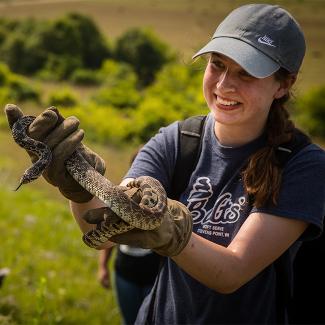What you'll learn studying Biotechnology at UW-Platteville
Undergraduate opportunities
Explore organisms and learn how to produce products that improve the quality of life for humans in the biotechnology minor program offered by the UW-Platteville Department of Biology. In your biotechnology courses, you’ll examine a variety of topics, ranging from pest resistant crops to the production of pharmaceuticals to effective and safe waste and water treatments, and you’ll gain the knowledge you need to begin a rewarding career.
Graduate programs
Take your biotechnology education even further by earning a master’s degree online in this exciting field. Whether your experience is in health care, agriculture, or manufacturing, you can earn your Master of Science in Applied Biotechnology online and advance your career. You’ll acquire a foundation in the principles and techniques of biotechnology and choose specialization tracks to match your career goals. We offer specializations in business management, quality assurance and compliance, and research and development.
In the business management track, you will explore marketing fundamentals and commercialization strategies for diverse areas of biotechnology, including pharmaceutical marketing, B2B marketing, and examine the importance of supply chain relevant to a variety of processes specific to biotechnology.
The quality assurance and compliance track will teach you how to ensure that quality standards are met at every stage from discovery to production. You will examine key regulatory agencies and practices within the highly regulated and diverse biotechnology industry. You will also analyze case studies of biotech industries, product design, clinical trials, and methods to ensure consumer and environmental protection.
With the research and development track, you will explore strategies for evaluating and implementing new products within diverse areas of biotechnology including agricultural, industrial, medical, and environmental. You will learn to evaluate scientific discovery and market value, navigate patent, intellectual property, and licensing requirements, and how to balance business growth with innovation.
Whether you’re minoring in biotechnology or earning your master’s degree, you will have the opportunity to complete a project for an actual workplace or professional setting and apply what you’ve learned to real-world problems. Through this experiential project, you will make professional connections in the industry, and learn skills that can help you land your dream job after graduation.
With an advanced degree in applied biotechnology, you can be part of the exciting growth in the biotechnology field. At UW-Platteville, you can earn your master’s degree at your pace with flexible courses that fit your schedule. The total cost of the program is $26,350*. Ask your admission counselor how you can reduce this cost with transfer credits or professional credentials.
*Subject to change without notice.
Graduate Certificate
A graduate certificate is a credential that equips you with foundational knowledge and skills in a particular field. Although it doesn't replace a master's degree, it proves competence in an area and bolsters your resume.
Careers in Biotechnology
Graduates with a minor in biotechnology from UW-Platteville will be prepared for a variety of exciting careers in the biotech industry. Your biotechnology classes will prepare you for a career as a laboratory technician or quality assurance specialist. Biotechnology university coursework also prepares you for careers in the following fields:
- Research and development
- Business development
- Human and animal health
- Pharmaceuticals
Biotechnology is a dynamic field with diverse applications across sectors. This diversity creates a range of careers in the field with varying job titles and responsibilities. Earning a master's degree or certificate in applied biotechnology will prepare you for a range of exciting potential biotechnology careers, including:
- Biomedical examiner
- Biological technician
- Clinical laboratory technician or technologist
- Environmental science and protection technician
- Epidemiologist
- Marketing or business development manager
- Microbiologist
- Quality assurance manager
- Regulatory affairs manager
- Research and development manager
- Research scientist
Most people who earn degrees in biotechnology work in laboratories or office settings.

Discover by doing
Whether you’re pursuing a minor or the Master of Science in Applied Biotechnology, you can participate in student clubs and organizations, research, internships, and university events. We also offer STEM Living Learning Communities, tutoring, mentoring, and other programs designed to support you and your goals as you earn your degree.





